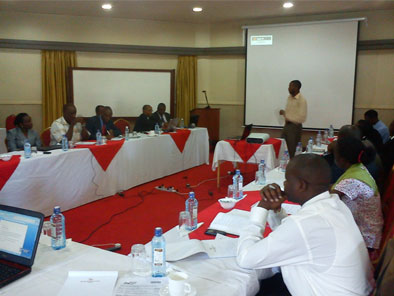The National Consultation Forum held on 27th Feb 2013 in Nairobi, Kenya reflected on some of the weaknesses of the Millennium Development Goals (MDGs), priority issues to incorporate in the next Sustainable Development Goals (SDGs) and foreseeable challenges.
GWP Eastern Africa provided financial support to both Kenya and Uganda Country Water Partnerships to come up with context-relevent water needs and priorities that will inform the next development agenda, come 2015.
Kenya’s consultative workshop aimed at listening to country needs and priorities regarding the future development agenda for water and sustainable development and provide a deeper qualitative understanding of individual country priorities for water post-2015.
Guiding frameworks for Incisive discussions
The discussions were guided by existing frameworks such policy, legal and other best practices within Kenya’s water sector. Henceforth, instruments such as Constitution of Kenya (2010), Kenya’s strategic development document (Vision 2030), Water Act of 2002, Reports on Water Sector Reforms (2002), The National Water Policy of 2012 (NWP 2012), Water Sector Strategic Plan (WSSP 2012-2015) were reviewed, analyzed and guided the discussions.
Challenges and Priority areas
Though most legal and policy documents clearly noted availability and accessibility of water as a citizen right and priority, falling levels of water per capita per annum and slow progress in water and sanitation coverage stand out as Kenya’s critical challenges. Kenya’s development agenda—Vision 2030 might be delayed in case water is not sustainably integrated and managed to support the country’s key sectors: industry, agriculture and energy.
Kenya recognizes that Water is Life and that water and water-related issues penetrate all aspects of society, cutting across all boundaries, be they political, administrative, social, economic and technological.
Participants to the consultative zeroed down to four mutually interconnected priority area: Integrated Water Resource Management; Sustainable Environment and Climate Resilience Mechanisms; and Productive Uses of water by Adapting the Sector Wide Approach to Planning (SWAP).
Inspired by the Kenya Constitution ( 2010) which emphasizes channeling 15% of the natural resources to counties, the meeting also underlined the need to equalize funds for water and sanitation service through availing affordable and access safe water and sanitation for all in both rural and urban areas.
Cross-cutting issues such as governance, gender and human rights based approach featured prominent and were strongly recommended as key components of the next development agenda.
